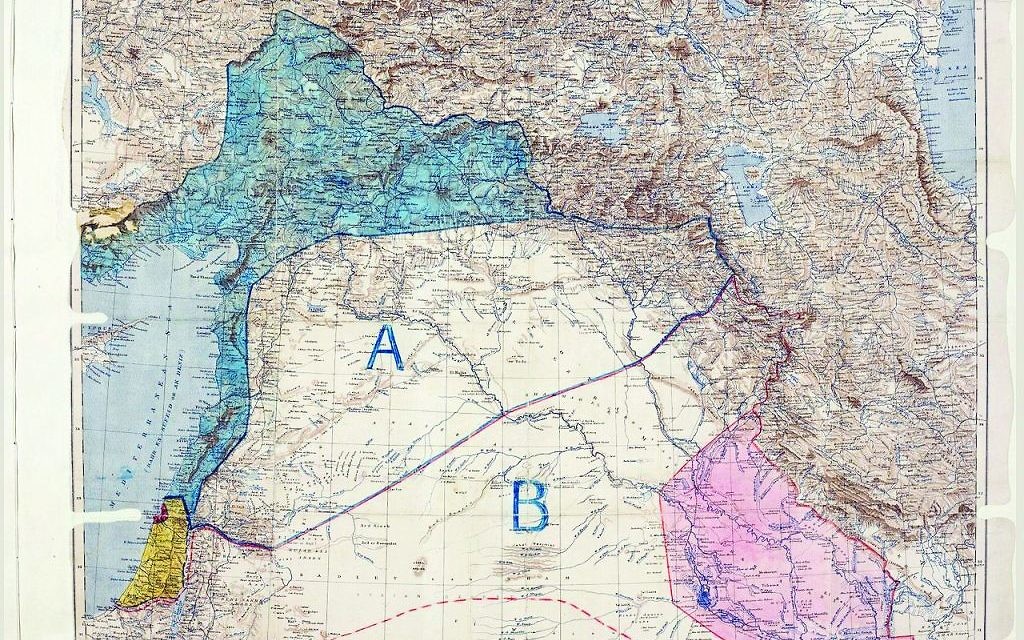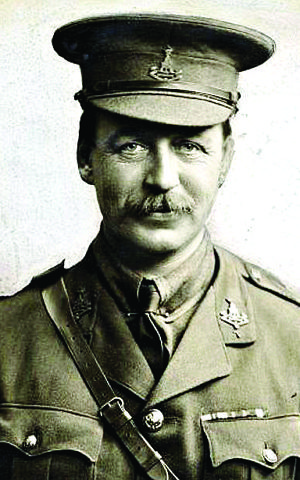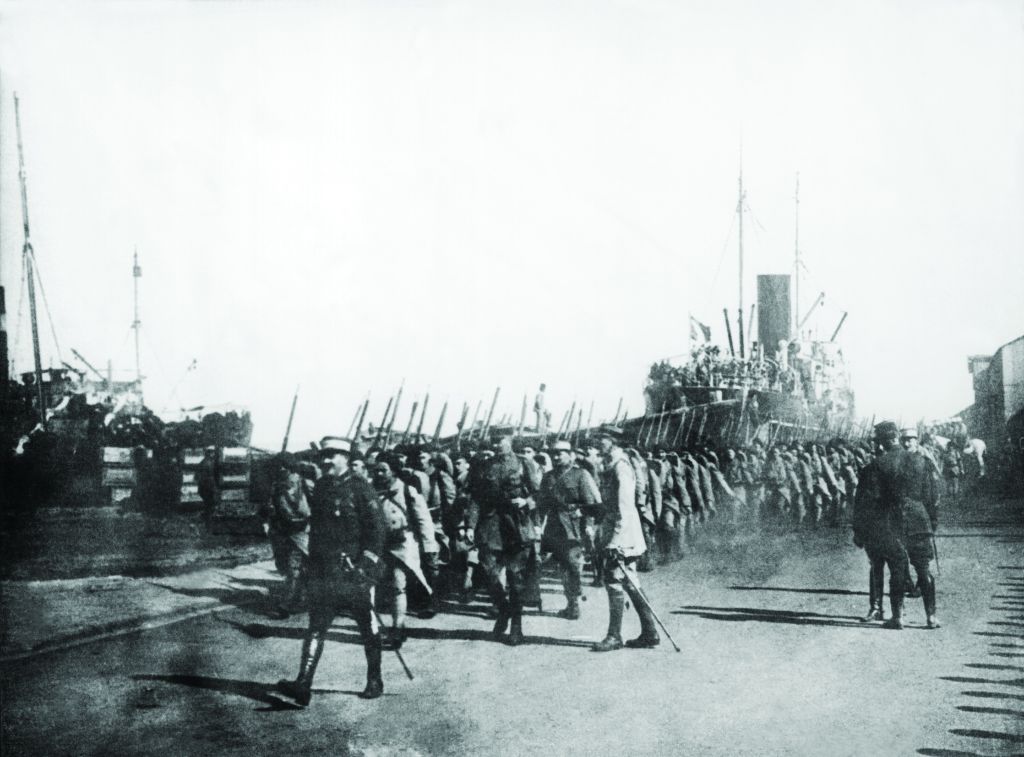The great Middle East carve up
One hundred years after the Sykes-Picot Agreement, we assesse the damage it caused and what analysts believe needs to happen now
When Mark Sykes and François Georges-Picot met in London and took a pen to a map of the Middle East 100 years ago this week, only one of them had ever been there. It was, some say, as if the two were playing a game of Risk.
Even if that’s an analogy too far, analysts are virtually unanimous that the subsequent Sykes-Picot Agreement between France and Britain – signed hastily in 1916 amid a world war – ill-defined a region, and consigned that region to its ill fortunes for the next century.
“Their lines are now falling apart,” says Miri Eisin, a former senior officer in Israel’s military intelligence now at the IDC in Herzliya. Eisin is one of only a small handful of women ever to make the rank of colonel in the IDF, and takes a hard-nosed view when it comes to Israel’s security.
Get The Jewish News Daily Edition by email and never miss our top stories Free Sign Up
“We all need to be on the same page: the Middle East is going through enormous upheaval,” she tells a UJIA delegation in Israel’s north.
Pointing to the map drawn by the Englishman and Frenchman, she says: “The only thing [about the Middle East] that will stay the same 100 years later is a photo taken from outer space, and even then, Palmyra is being erased.”
From Israel’s point of view, she says, the lines drawn “are colonial lines, lands conquered by the British and the French in 1917-18… This is our heritage, borders defined by somebody outside, not by the peoples of the Middle East”.
At least Sykes knew the Middle East, she says of the son of Orientalists who spoke Arabic. Picot had never been there.
“They took a map of the Ottoman Empire and divided it, before they’d even conquered it, like they were playing a game of Risk.”
Alongside the French and British portions, Palestine – the Holy Lands – came under a supposedly “international” section, the line drawn from Haifa (Acre/Akko) to Kirkuk, the heart of the Kurdish area, which may soon declare itself an independent state, and where Kurds are currently leading the fight against Islamic State.
One hundred years ago, this was “a place, a nation, a people, a language, a culture, with Christians, Jews and Muslims,” says Eisin, noting similarities with Israel. But their mountainous homeland was divided between Syria, Turkey, Iraq and Iran. “If I was Kurdish, and wanted to make a statement,” she says, “I’d declare Kurdistan this year, 100 years after it was wiped off the map. The Kurds existed in 1916, but they didn’t really matter to the British and French.”
The 1916 lines began unravelling from the start, say some, with early Zionists behind the first challenge. Last week, at a “lesson-learning” conference in Israel held by the Jerusalem Center for Public Affairs (JCPA), Martin Kramer of Shalem College argued that Zionism had one aim in the early part of the 20th century: to swap the Sykes-Picot Agreement for a British protectorate in order to allow the Jewish project to flourish.
“The Balfour Declaration was the first attempt to unravel Sykes-Picot,” he says. “Israel would never have been born if Sykes-Picot had remained [in-place].” Former Israeli ambassador Freddy Eytan says the region became one of confrontation in part because of “the rivalry between the US and USSR, the control of natural resources, gas and oil, the arms race, arms supplies and freedom of navigation in the Suez Canal” which “all prompted a power battle”. The centenary, he says, is “a reminder to avoid the naiveté and mistakes of the past”.
Prof. Efraim Karsh of King’s College London is even more scathing, and says the centenary shouldn’t even be commemorated. “A celebration of Sykes-Picot is misconceived… It had no impact because it never came into existence.”
Alan Baker, former deputy director-general of Israel’s Ministry of Foreign Affairs, agrees it is a “curious, even sad” centenary. “The whole character of the region is changing beyond all recognition. From Libya to Iraq, authority has collapsed. People are reaching for their older identities – Sunni, Shi’ite, Kurdish, even tribal. Sectarian groups, often Islamist, have filled the power vacuum, spilling over borders and spreading violence.”
Moreover, the problems of the peoples of the region are so distinct from times past as to be unrecognisable. “Half of the Middle East’s population today was born after 1990, after the failure of the Israeli-Palestinian process,” says Eisin.
“You have to put it in perspective. Their heritage isn’t the 1948 battles [for the State of Israel], as mine is.” The challenges aren’t about recognising Israel, or the Israeli-Palestinian conflict, but about jobs, housing, water, getting married so their family will let them leave home. It’s a different world.”
No longer a game of Risk, then.

Thank you for helping to make Jewish News the leading source of news and opinion for the UK Jewish community. Today we're asking for your invaluable help to continue putting our community first in everything we do.
For as little as £5 a month you can help sustain the vital work we do in celebrating and standing up for Jewish life in Britain.
Jewish News holds our community together and keeps us connected. Like a synagogue, it’s where people turn to feel part of something bigger. It also proudly shows the rest of Britain the vibrancy and rich culture of modern Jewish life.
You can make a quick and easy one-off or monthly contribution of £5, £10, £20 or any other sum you’re comfortable with.
100% of your donation will help us continue celebrating our community, in all its dynamic diversity...
Engaging
Being a community platform means so much more than producing a newspaper and website. One of our proudest roles is media partnering with our invaluable charities to amplify the outstanding work they do to help us all.
Celebrating
There’s no shortage of oys in the world but Jewish News takes every opportunity to celebrate the joys too, through projects like Night of Heroes, 40 Under 40 and other compelling countdowns that make the community kvell with pride.
Pioneering
In the first collaboration between media outlets from different faiths, Jewish News worked with British Muslim TV and Church Times to produce a list of young activists leading the way on interfaith understanding.
Campaigning
Royal Mail issued a stamp honouring Holocaust hero Sir Nicholas Winton after a Jewish News campaign attracted more than 100,000 backers. Jewish Newsalso produces special editions of the paper highlighting pressing issues including mental health and Holocaust remembrance.
Easy access
In an age when news is readily accessible, Jewish News provides high-quality content free online and offline, removing any financial barriers to connecting people.
Voice of our community to wider society
The Jewish News team regularly appears on TV, radio and on the pages of the national press to comment on stories about the Jewish community. Easy access to the paper on the streets of London also means Jewish News provides an invaluable window into the community for the country at large.
We hope you agree all this is worth preserving.
- François Georges-Picot
- Mark Sykes
- Sykes-Picot Agreement
- France
- Britain
- Miri Eisin
- Herzliya
- middle east
- UJIA
- Palmyra
- 1917
- 1918
- Ottoman Empire
- Holy Lands
- Palestine
- Kirkuk
- Kurds
- Islamic State
- News feature
- Syria
- Turkey
- Iraq
- iran
- Arabic
- Kurdistan
- Jerusalem Center for Public Affairs
- jcpa
- Shalem College
- Zionism
- Palestinian nationalism
- Jewish project
- Balfour declaration
- USSR
- Suez Canal
- king's college london
- Israel’s Ministry of Foreign Affairs
- Special report
- Features
- The United States (US)
-
By Laurent Vaughan - Senior Associate (Bishop & Sewell Solicitors)
-
By Laurent Vaughan - Senior Associate (Bishop & Sewell Solicitors)
-
By Laurent Vaughan - Senior Associate (Bishop & Sewell Solicitors)
-
By Laurent Vaughan - Senior Associate (Bishop & Sewell Solicitors)

























